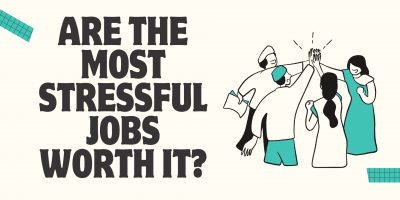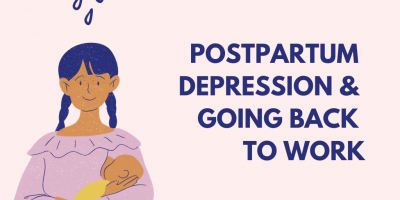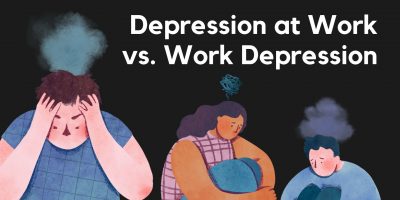
Are the Most Stressful Jobs Worth It?
Is a high-earning job worth it if you don’t have enough free time to enjoy its benefits?

Understanding why healthy work-life balance is important begins with knowing what work-life balance is really. According to a survey by Harvard Business study, 94% of people were working more than 50 hours a week, and that’s a lot of burnout which eventually affects both employees’ health and personal life.
The concept of work-life balance is much more than just managing time or equalizing a see-saw with work on one side and personal life on the other. Time management is not the solution to maintaining a healthy work-life balance as you’ll only fall short of productivity to hustle in both ways.
There is no standard work-life balance definition, and it’s a subjective concept and differs from one individual’s need to another. You cannot adhere to a guidebook definition of achieving a world-life balance as a solution.
It would be best if you had a tailored work-life balance blueprint that fulfills your personal needs, dreams, and goals while addressing the reasons behind why you crave more balance in your life. Work-life balance simply means you feel content about yourself.
The traditional definition of work-life balance is confined to the idea of either this or that side of the see-saw of life. But life is much more complicated and integrated than just trying to maintain work and personal life equilibrium. Since work takes up a major part of your life, prioritizing work over personal time does not necessarily mean bad.
There is no such trade-off in real-time. Life is about trade-offs, and maintaining a healthy work-life balance is a struggle for everyone because they cannot prioritize one over the other due to internal guilt. Pitting against work against your personal life even though that’s what you like doing leaves you with a feeling of shame and guilt which shouldn’t be the problem. It’s about wanting success in a career without compromising their health or personal relationships.
Another misconception about a healthy work-life balance is that it’s not a one-size-fits-all strategy but more of a tailored one that meets the needs of each individual differently. Since everyone’s circumstances and priorities differ, adhering to a standardized approach will only mess up your schedule.
The definition of work-life balance keeps changing over time. It needs to have a more strategic approach to finding out what balance is exactly, i.e., a definition that follows a flexible framework that allows you to easily revise your work-life balance definition as you progress into new career and life stages.
Before jumping into creating a healthier work-life balance, you need to know why you need it and why it is important. It’s easier to make something when you have a deeper understanding. To create a lifestyle first, you should acquaint yourself with the idea of your own needs-
Balancing your work and personal life is necessary for mental and physical health. Exhaustion from either will only lead to more toxicity.

Workplace stress is estimated to be the 5th leading cause of death in the United States of America. And almost a quarter of Americans consider their job to be a major source of stress. It further affects employees’ mental health and causes a drop in productivity and employee retention.
Mental health is one of the main reasons why work-life balance is important. In today’s world, mental health is as important as your physical health, and if your work life is adversely affecting either of the ones, you need to start paying attention to it. To avoid burnout or stress, you need to maintain a healthy balance between your work and personal life. One shouldn’t overlap the other. Feeling overlooked at work or burnout can often lead to depression and unhealthy relations at home and work.
When you’re feeling balanced, you’re more capable of dealing with criticism and negative thoughts, giving you more space to think and reevaluate your choices. It also allows you to become more self-aware, which means better-informed decisions.
Another reason to have a more balanced life is to have better physical health. Taking time out for yourself and your health is an important step towards achieving a more healthy life. Since most of you spend your time working at a desk or sitting in front of a screen, these negatively affect your health. With the hustle of juggling work meeting deadlines, one hardly has time to have one proper meal, let alone take some time to exercise or have a blanched diet. You’re left to thrive on junks and quick bites, leading to several health issues like obesity, diabetes, cardiovascular issues, and dealing with the stress, and employees often end up smoking, which again is a problem.
So when you have a balanced work-life, you’re left with an ample amount of time to focus more on your personal and professional growth, including your health. Setting fitness goals can help you achieve work-life balance too. It can start with you:
Exercising and meditating daily often act as great stress relievers. Even if you don’t have much time to indulge in social gatherings, exercising daily can boost your energy levels and mood by releasing endorphins in your body. Endorphins are the chemicals produced by the body to deal with stress or pain, otherwise known as the “feel-good chemicals.”
Another way to improve your mental and physical health is to meditate or practice mindfulness. It’s all about sticking to the small steps you take towards a healthier and balanced lifestyle. You can always begin by practicing deep breathing or grounding yourself in the present moment. Over time, you will notice that you can meditate for about 15 minutes at a time.

Another reason why work-life balance is important is that it enhances your ability to be present and live in the moment. One of the most recurring complaints about people who work is how they end up missing out on the important events in their life or their inability to be present both at work or home. And it’s not your fault to be always racing your mind or cluttering your mind with thoughts that are often difficult to decipher.
Work culture has become so toxic that it has even led to OCD behaviors among workers leading them to constantly check their emails or fixate on things from work even when they’re at home or outside work. It is not healthy for both your mental health and your relationships. But when you practice mindfulness, you can achieve that balance in your life.
You can rewire and redirect your mind through certain mindfulness practices. It helps you be more attuned with your emotions and respond to people more intuitively both at work and home.
When you lead a more balanced lifestyle, you get to spend more time with your family and friends. It helps you reconnect with your close ones and work on your relationships which are often deteriorated with work stress and workload. Having a balanced work-life will also help you create a healthy boundary between your professional and personal life. There’s a ripple effect on your productivity as well, as when you’re more content and satisfied with your personal life and relationships, you’re more focused on your work too.
And lastly, a balanced work-life increases employees’ engagement at work. When employees are more happy and content with their lives, they’re more likely to be engaged at work. With fewer distractions and burnout, employees are amped up to be more productive. Since being engaged means being committed to what you do, it only motivates them to give out their best. Again, when you’re stressed out or overwhelmed with workload pressure, you cannot think clearly, let alone creatively.
When you have a healthy work-life balance, you’re more open to thinking creatively or exploring new ideas leading to better performance at work. It’s a common misconception that balance in your workplace won’t pave the way for your success. But it is not true. To succeed in your career, you should be more aligned and focused on your goals. It is about creating a life of success with your terms, .i.e., by prioritizing and focusing on what’s important to you, ensuring your well-being, and taking more control of your life.
Thus, to sum it up, you can say that a well-balanced lifestyle will only make you a clear, well-rounded, and creative thinker, and it’ll also make you more productive and create more success in your career and personal life. Remember, a great leader always supports and knows the Importance of a healthy work-life balance.
Co-Founder & CTO of Vantage Circle
Browse our curated list of vendors to find the best solution for your needs.
Subscribe to our newsletter for the latest trends, expert tips, and workplace insights!

Is a high-earning job worth it if you don’t have enough free time to enjoy its benefits?

From decreased productivity to poor workplace relationships – gain insights on recognizing, addressing, and mitigating the consequences of substance abuse at work.

Postpartum and peripartum depression (PPD) is the most common mental disorder experienced after childbirth. So, what happens while you’re in the midst of it or recovering, and you’re due to return to work?

Is there still a long way to go in fostering a culture of empathy where depression at work and work depression are viewed and treated with the same respect and urgency as any other health issue?
Used by most of the top employee benefits consultants in the US, Shortlister is where you can find, research and select HR and benefits vendors for your clients.
Shortlister helps you reach your ideal prospects. Claim your free account to control your message and receive employer, consultant and health plan leads.